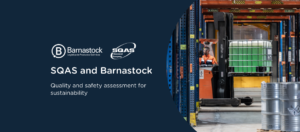In our previous articles we talked about a few safety measures that have to be taken in order to minimize the risks linked to the storage and handling of dangerous goods. However there are a lot of other elements to take into consideration, and they are far from being less complicated. The chemical industry is subject to a lot of laws and regulations. Respecting them is thus compulsory if you want store this kind of products.
What are dangerous goods?
To be quite simple, it is a substance that represents a hazard for the people handling it or for the environment.
Dangerous goods are divided into several categories; some of them are explosive, flammable, corrosive or poisonous. Even though they may not look dangerous, not respecting the storage requirements for instance the fact that some substances have to be kept a low temperature, in a dry place, or away from other products (refer to the Risk and Safety statements) could lead to a potential dangerous reaction. Taking chances should never be an option for one single mistake could blow out of all proportions.
Dangerous goods are used by almost all business such as manufacturing, warehousing, logistics and pharmaceutical companies, are clearly bound to store a lot of them, obviously more than smaller businesses for instance printers, workshops, furniture and hardware stores, supermarkets or pool shops.
In order to work efficiently, a company may have to store and use several dangerous goods. Given the fact that all chemicals are different, their effects on our health can vary. You have to be aware of the nature of the substance in order to establish whether its poor handling could lead to a burn, a fire, an explosive or even worse, death. As we said earlier, the infrastructure of your company has to be suitable for the storage of such substances, as well as being safe as far as its electrical installation or even its ventilation system are concerned.
What are the laws the chemicals industry is regulated by?
In Spain the storage of chemical products (APQ Almacenamiento de productos químicos) is regulated by the RD (Royal decree) 379/2001 later modified by the RD 105/2010. Besides, it is possible to find information in the Additional Technical Instructions (ITC Instrucciones técnicas complementarias in Spanish). To this day, there are 10 different types of ITC. Each ITC corresponds to one type of chemical:
- ITC-MIE-APQ-000: General definitions
- ITC-MIE-APQ-001: Storage of flammable and combustible liquids
- ITC-MIE-APQ-002: Storage of ethylene oxide
- ITC-MIE-APQ-003: Storage of chlorine
- ITC-MIE-APQ-004: Storage of anhydrous ammonia
- ITC-MIE-APQ-005: Storage of compressed, liquefied and dissolved gas bottles and cylinders
- ITC-MIE-APQ-006: Storage of corrosive liquids
- ITC-MIE-APQ-007: Storage of toxic liquids
- ITC-MIE-APQ-008: Storage of fertilizers based on ammonium nitrate high in nitrogen
- ITC-MIE-APQ-009: Storage of organic peroxide
- ITC-MIE-APQ-010: Storage in mobile containers
What quantity of chemicals can I store in my warehouse?
You can use the information below to know what regulation will apply to the product you are going to store. You can find some of the elements that you have to take into consideration when storing your dangerous goods, such as the maximum quantity allowed for each type of chemical. For instance, the storage of solid flammable goods is limited to 1000kg. Going over this limit is illegal and could expose you to legal issues and problems.
Do I have to adapt my warehouse?
You may have to adapt your infrastructure depending on the type of products you want to store. Some chemicals need to be kept at a low temperature for instance, so you have to be able to provide the proper storage conditions, not only from a legislative point of view but also from a safety point of view.
There is also the possibility to hire the services of a company specialized in the storage and handling of dangerous goods, such as ours. Indeed Barnastock owns different types of warehouses in terms of size, safety, that are perfectly adapted to the storage of chemicals products. Please do not hesitate to contact us if you need any further information.
What are the sanctions related to the storage of dangerous goods?
A company that does not meet these requirements could be asked to put a stop to all its activities as long as the facility is not suitable for the storage of the chemicals products involved.





